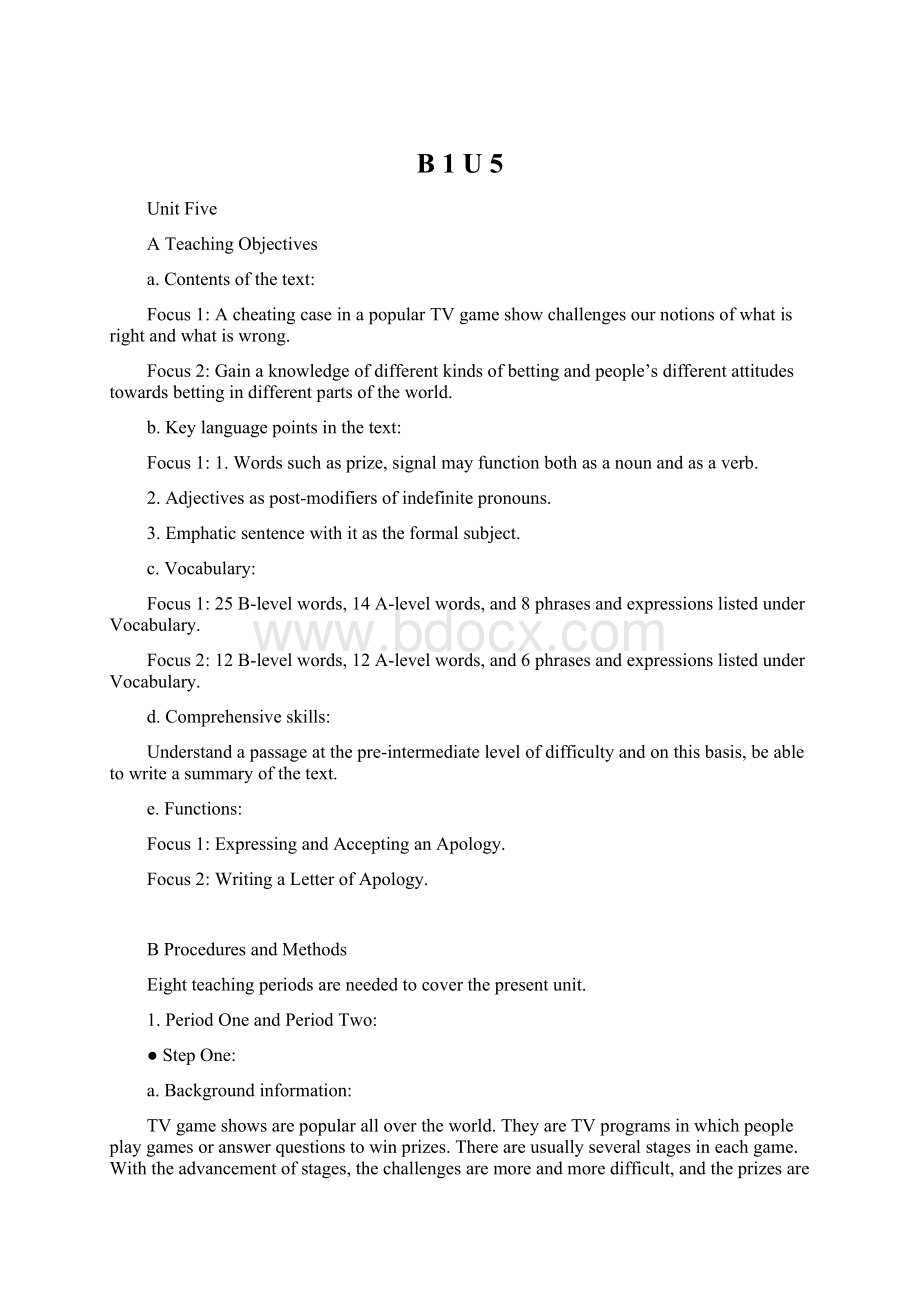B 1 U 5.docx
《B 1 U 5.docx》由会员分享,可在线阅读,更多相关《B 1 U 5.docx(18页珍藏版)》请在冰豆网上搜索。

B1U5
UnitFive
ATeachingObjectives
a.Contentsofthetext:
Focus1:
AcheatingcaseinapopularTVgameshowchallengesournotionsofwhatisrightandwhatiswrong.
Focus2:
Gainaknowledgeofdifferentkindsofbettingandpeople’sdifferentattitudestowardsbettingindifferentpartsoftheworld.
b.Keylanguagepointsinthetext:
Focus1:
1.Wordssuchasprize,signalmayfunctionbothasanounandasaverb.
2.Adjectivesaspost-modifiersofindefinitepronouns.
3.Emphaticsentencewithitastheformalsubject.
c.Vocabulary:
Focus1:
25B-levelwords,14A-levelwords,and8phrasesandexpressionslistedunderVocabulary.
Focus2:
12B-levelwords,12A-levelwords,and6phrasesandexpressionslistedunderVocabulary.
d.Comprehensiveskills:
Understandapassageatthepre-intermediatelevelofdifficultyandonthisbasis,beabletowriteasummaryofthetext.
e.Functions:
Focus1:
ExpressingandAcceptinganApology.
Focus2:
WritingaLetterofApology.
BProceduresandMethods
Eightteachingperiodsareneededtocoverthepresentunit.
1.PeriodOneandPeriodTwo:
●StepOne:
a.Backgroundinformation:
TVgameshowsarepopularallovertheworld.TheyareTVprogramsinwhichpeopleplaygamesoranswerquestionstowinprizes.Thereareusuallyseveralstagesineachgame.Withtheadvancementofstages,thechallengesaremoreandmoredifficult,andtheprizesarehigherandhigher.Manycontestantsandaudiencesareattractedbythehighprizesandtheexcitementoftheshows.Inordertowinahighprize,somecontestantsevenusesomeillegalmethods.Butoncecheatingisdiscoveredinthesegames,thewinnerswillhavetoreturnalltheirwinnings,andfacelegalprosecution.
b.warm-upquestions
Haveyoueverbeencheatedordoyouknowanystoriesaboutcheaters?
WhatisyourfavoriteTVgame?
(Thewarm-upexerciseshallnottakeupmorethan8minutes.)
●StepTwo:
Gooverthekeywordsandexpressionsinthetext.
*million//
num.百万,百万个(人或物)
[pl.]许多,无数
Tomwontwomilliondollarsinthelottery.
*millionaire/()/
n.[C]百万富翁,大富豪
Hedreamsofbecomingamillionaire.
☆contestant//
n.[C]竞争者,参赛者
Thereweremorethan5,000contestantsinthiscompositioncompetition.
*personality//
n.[C,U]人物,名人;个性,人格
Hehasalreadybecomeapersonalityinthenews.
*audience//
n.[C]观众,听众,读者
Theaudienceisalwaysexcitedbyawonderfulgame.
☆haltingly//
ad.结结巴巴地,断断续续地,犹豫不决地
Shynessmadethegirlspeakhaltingly.
*peculiar/()/
a.特殊的,独特的;奇怪的,古怪的
Thisbookhasapeculiarvalue.
☆crazy//
a.狂热爱好的,着迷的;发疯的,荒唐的
Sheiscrazyaboutdancing.
*progress//
vi.前进,进步,进展
//n.[U]前进,进步,进展
Maryisprogressinginplayingtennis.
☆phase//
n.[C]阶段,时期;面,方面
Thechildisgoingthroughadifficultphase.
*frequently//
ad.经常,频繁地
Ifrequentlyvisitthatlibrary.
*signal//
n.[C]信号,暗号
vt.发信号,用信号联系
Aredlightisusuallyasignalofdanger.
☆extraordinary//
a.特别的,非常的,非凡的
Whatanextraordinaryidea!
*sympathetic//
a.同情的,有同情心的;赞同的
ShewasverysympathetictowardsJane.
*regular/()/
a.有规律的,有规则的;经常的,习惯性的;整齐的,匀称的;正规的,正式的
Hekeptregularlivingschedules.
☆occasionally//
ad.偶尔,偶然,有时候
Hetakesaglassofwineoccasionally.
*purpose//
n.[U,C]目的,意图;用途,效果
What’syourpurposeofdoingthat?
*control//
n.[U]控制,支配;克制,抑制
vt.控制,支配;克制,抑制
Thismachineisoutofcontrol.
☆accuse//
vt.指控;指责
Sheaccusedhimoftheft.
*tape//
n.[U]录像带,录音带;磁带;带子,胶布
vt.录音,录像;用带子捆,用胶布固定
Doyouwanttowatchthistape?
☆verify//
vt.证明,证实;查对,核实
Hasthemurderbeenverified?
*guilt//
n.[U]犯罪,罪行,责任;内疚
Wenowhavetheproofofhisguilt.
*guilty//
a.有罪的;内疚的
Hewasproved/provenguilty.
*cheat//
vt./vi.欺骗,骗取,作弊
n.[C]骗子;欺骗,欺诈行为
Don’ttrytocheatme.
☆appropriate//
a.适当的,恰当的
Hisclothesarenotappropriateforsuchameeting.
*anyway//
ad.不管怎么说,无论如何
Iwillgoandseeheranyway.
*challenge//
vt.质询,质疑,提出异议;向……挑战
n.[C]挑战,困难
Theywenttothecourttochallengethedecision.
*justice//
n.[U]司法,法律制裁;正义,公正
I’velostmyfaithinacertaincountry’sjustice.
☆offence//
n.[C,U]违法行为,罪行;冒犯,得罪,违反
Hecommittedanoffenceagainstthelaw.
☆robbery//
n.[C]抢劫,盗取;非法剥夺
Haveyouheardaboutthatbankrobbery?
*excellent//
a.优秀的,卓越的,杰出的
Theyhavedoneanexcellentjob.
gameshow
(电视)游戏表演,竞赛节目
besureof
肯定
changeone’smind
改变想法(主意)
onpurpose
故意,有意
beguiltyof
犯了……罪
gotoprison
入狱,关进监狱
inprison
在牢里
administerjustice
执行审判
●StepThree:
Starttoteachthetextpara.bypara.Helpstudentsunderstandthetextandexplainlanguagepointsmeanwhile.
QuestionsAboutPara.1
(1)WhatkindofprogramisWhowantstobeamillionaire?
(2)Whatwillhappentothecontestantifheorshegetstherightanswerinthegame?
(3)Whatisthetopprizeforthefinalwinner?
NotesofPara.1
million:
num.[C]1,000,000百万,百万个(人或物)
e.g.
(1)Tomwontwomilliondollarsinthelottery.汤姆买彩票中了两百万美元。
(2)SeveralmillionpeoplewatchedthisprogramonTV.几百万人在电视上看了这个节目。
million作复数时,意为“averylargeamount许多,无数”。
e.g.Hemadehismillionsoncarsales.他通过汽车买卖赚了许许多多的钱。
注意:
在表示具体数字时,million的复数形式为原形,如3million,severalmillion;但是millionsof用来表达一个笼统的数目,意思是“千百万的”。
用法相同的还有hundredsof,thousandsof。
Themoneyincreasesforeachquestionuntil,ifthecontestanthasansweredalltheotherquestionscorrectly,theprizeforthefinalquestionisonemillionpounds.每答对一道题,奖金就会增加,如果参赛者正确回答前面所有的问题,那么最后一题的奖金就会升至100万英镑。
在这个句子中,until引导时间状语从句,这个状语从句比较复杂,还含有一个if引导的条件状语从句。
e.g.Icouldn’tsewuntilIwassix.我直到六岁才会用针缝东西。
NotesofPara.2
personality:
n.[C,U]celebrity,famousperson人物,名人
e.g.
(1)Hehasalreadybecomeapersonalityinthenews.他已经成了一个新闻人物。
(2)SheisaTVpersonalityknownbyeveryone.她是一位众人皆知的电视名人。
personality更常用的意思是“thewholenatureofaparticularperson个性,人格”。
e.g.Theyaretwins,buttheyhavedifferentpersonalities.他们是双胞胎,但是性格迥异。
personality从形容词personal派生而来,后者意为“relatingorbelongingtoasingleorparticularperson 个人的,私人的;亲自的;针对个人的,有关私人的”。
e.g.
(1)Ihavesomethingpersonaltodiscusswithyou. 我有点私事要和你商量。
(2)Personalcleanlinessisimportanttohealthaswellastoappearance. 个人的干净清洁对健康和仪表都很重要。
audience:
n.[C]agatheringofspectatorsorlistenersata(usuallypublic)performance观众,听众,读者
e.g.
(1)Theaudienceisalwaysexcitedbyawonderfulgame.精彩的比赛总会使观众非常激动。
(2)Anaudienceofabout3,000crowdedthetheatre.剧院里挤满了约3000名观众。
注意:
audience是集体名词(collectivenoun),在上面例句中不用复数形式。
此外,观赏戏剧或音乐会的人叫audience,观看体育比赛的人叫spectators,参见本册第四单元第一篇文章的有关解释。
haltingly:
ad.stoppingandstartingoften,notfluently结结巴巴地,断断续续地,犹豫不决地
e.g.
(1)Shynessmadethegirlspeakhaltingly.由于害羞那姑娘说话结结巴巴的。
(2)Hebegantospeakhaltinglywhenhewasnervous.他一紧张就开始结巴。
haltingly的词根是动词halt,意为“tostopmoving;tomakesomethingstopmoving停住,停止”。
e.g.
(1)Thesoldiershaltedforarest.士兵们停下来休息。
(2)Hehaltedthecarattheredtrafficlights.他在红灯时停住了汽车。
halt作名词时,意为“astoporpause停住,停止”。
e.g.Thecarcametoahaltjustintimetopreventanaccident.汽车及时停下,避免了一场车祸。
QuestionAboutPara.3
(4)Whatisan“AnthonyEden”?
(5)HowmuchmoneydidIngramwinintheend?
(6)WhatdidIngramkeepdoinginthegame?
NotesofParas.3-4
crazy:
a.veryenthusiasticorexcitedaboutsth.狂热爱好的,着迷的;发疯的,荒唐的
e.g.
(1)Sheiscrazyaboutdancing.她热衷于跳舞。
(2)Hewouldbecrazytodrivehiscarsofast.他开车这么快,真是疯了。
progress:
vi.tomoveforward前进,进步,进展
e.g.
(1)Maryisprogressinginplayingtennis.玛丽打网球的技术正在进步。
(2)Ourcompanyisprogressingrapidly.我们的公司在快速发展。
progress还可以作不可数名词,意为“advancementtoanimprovedormoredevelopedstateortoaforwardposition前进,进步,进展”。
e.g.
(1)YouhavemadeprogressinEnglish.你的英语已经取得了进步。
(2)Ourcompanyhasmaderapidprogressinrecentyears.我们公司近几年发展迅速。
注意:
progress作动词时,重音在后面的音节上,作名词时,在第一个音节上。
phase:
n.[C]astageinaprocessofchangeordevelopment阶段,时期;面,方面
e.g.
(1)Thechildisgoingthroughadifficultphase.那孩子正经历困难时期。
(2)Thetwosetsoftrafficlightswereoutofphase.那两组交通信号灯不协调。
besureof:
tofeelcertainorconfidentof肯定
e.g.
(1)Areyousureofyourfacts?
你肯定你说的都是事实吗?
(2)Heisprettysureoftheanswer.他对这个答案非常肯定。
must:
在句中并不是表示“必须”的意思,must+have+过去分词表示对过去的推测,意思是“一定,肯定”。
参看本册第一单元第一篇文章的有关注释。
这里再举两个例子:
e.g.
(1)Youmustbeinthefirstgrade.你一定是一年级的学生。
(2)Hemusthavebeentherebefore.他以前一定去过那里了。
例
(1)是对目前状况的推测,例
(2)则是对过去状况的推测。
该结构用于对过去的肯定推测,否定推测需用can’t/couldn’t+have+过去分词。
e.g.Theycouldn’thavegonetoEngland.他们不可能去了英国。
Tomanyintheaudiencethatnight,itseemedasifhekeptchanginghismindandfrequentlyrepeatedananswerasifwaitingforasignal.在当晚的很多观众看来,他似乎一直在改变主意,并频频重复一个答案,好像在等暗示一样。
本句中出现了两个asif,但它们的句法功能不一样。
前一个asif引导名词性从句,作表语;后一个asif引导的是一个省略的方式状语从句,相当于asifhewaswaitingforasignal。
另外,如果asif/asthough引导的从句与主句有相同的主语,从句主语可以省略,本句就是如此,waiting的逻辑主语就是主句的主语。
e.g.Shestoodupasiftosaysomething.她站起来,好像要说什么似的。
asif:
连词,意为“好像,似乎”。
e.g.
(1)Itlooksasifitisgoingtorain.看上去好像要下雨了。
(2)Itseemedasiftheywerebrothers.他们看起来像兄弟。
(3)Helookedveryhappy,asifhehaddiscoveredagoldmountain.他看上去很高兴,好像发现了一座金山一样。
asif引导的从句的谓语动词可以是陈述语气,也可以是虚拟语气。
例
(1)中asif引导的从句谓语动词是陈述语气,例
(2)和例(3)则是虚拟语气。
例
(1)表示下雨的可能性还是有(尽管微乎其微),所以用陈述语气,而例
(2)则表示不可能的事实,例(3)表示没有发生的事。
frequently:
ad.often经常,频繁地
e.g.
(1)Ifrequentlyvisitthatlibrary.我经常去那个图书馆。
(2)Hefrequentlymakesthesamemistake.他常常犯同一个错误。
frequently去掉-ly成为形容词,意为“happeningordoingsth.often时常发生的,频繁的”。
e.g.
(1)Ienjoyhisfrequentvisits.我喜欢他经常来访。
(2)Heisafrequentcallerofourhouse.他是我家的常客。
大部分形容词加-ly可构成副词。
但friendly,deadly,lovely,lonely,likely,lively,ugly,brotherly等仍为形容词。
signal:
n.[C]asign,movementorsoundthatcarriesamessage信号,暗号
e.g.
(1)Aredlightisusuallya